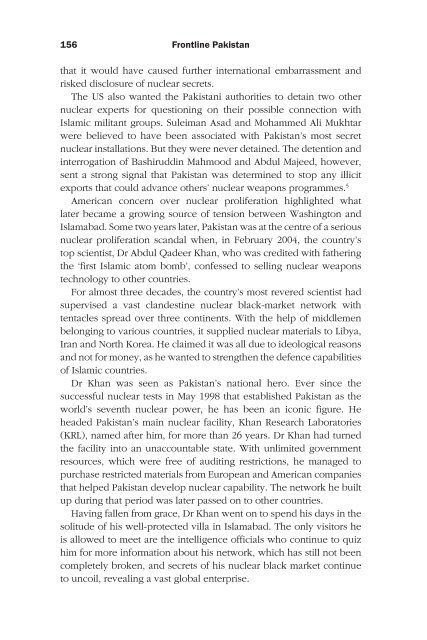Frontline Pakistan : The Struggle With Militant Islam - Arz-e-Pak
Frontline Pakistan : The Struggle With Militant Islam - Arz-e-Pak
Frontline Pakistan : The Struggle With Militant Islam - Arz-e-Pak
You also want an ePaper? Increase the reach of your titles
YUMPU automatically turns print PDFs into web optimized ePapers that Google loves.
1 <strong>Frontline</strong> <strong><strong>Pak</strong>istan</strong><br />
that it would have caused further international embarrassment and<br />
risked disclosure of nuclear secrets.<br />
<strong>The</strong> US also wanted the <strong><strong>Pak</strong>istan</strong>i authorities to detain two other<br />
nuclear experts for questioning on their possible connection with<br />
<strong>Islam</strong>ic militant groups. Suleiman Asad and Mohammed Ali Mukhtar<br />
were believed to have been associated with <strong><strong>Pak</strong>istan</strong>’s most secret<br />
nuclear installations. But they were never detained. <strong>The</strong> detention and<br />
interrogation of Bashiruddin Mahmood and Abdul Majeed, however,<br />
sent a strong signal that <strong><strong>Pak</strong>istan</strong> was determined to stop any illicit<br />
exports that could advance others’ nuclear weapons programmes. 5<br />
American concern over nuclear proliferation highlighted what<br />
later became a growing source of tension between Washington and<br />
<strong>Islam</strong>abad. Some two years later, <strong><strong>Pak</strong>istan</strong> was at the centre of a serious<br />
nuclear proliferation scandal when, in February 2004, the country’s<br />
top scientist, Dr Abdul Qadeer Khan, who was credited with fathering<br />
the ‘first <strong>Islam</strong>ic atom bomb’, confessed to selling nuclear weapons<br />
technology to other countries.<br />
For almost three decades, the country’s most revered scientist had<br />
supervised a vast clandestine nuclear black-market network with<br />
tentacles spread over three continents. <strong>With</strong> the help of middlemen<br />
belonging to various countries, it supplied nuclear materials to Libya,<br />
Iran and North Korea. He claimed it was all due to ideological reasons<br />
and not for money, as he wanted to strengthen the defence capabilities<br />
of <strong>Islam</strong>ic countries.<br />
Dr Khan was seen as <strong><strong>Pak</strong>istan</strong>’s national hero. Ever since the<br />
successful nuclear tests in May 1998 that established <strong><strong>Pak</strong>istan</strong> as the<br />
world’s seventh nuclear power, he has been an iconic figure. He<br />
headed <strong><strong>Pak</strong>istan</strong>’s main nuclear facility, Khan Research Laboratories<br />
(KRL), named after him, for more than 26 years. Dr Khan had turned<br />
the facility into an unaccountable state. <strong>With</strong> unlimited government<br />
resources, which were free of auditing restrictions, he managed to<br />
purchase restricted materials from European and American companies<br />
that helped <strong><strong>Pak</strong>istan</strong> develop nuclear capability. <strong>The</strong> network he built<br />
up during that period was later passed on to other countries.<br />
Having fallen from grace, Dr Khan went on to spend his days in the<br />
solitude of his well-protected villa in <strong>Islam</strong>abad. <strong>The</strong> only visitors he<br />
is allowed to meet are the intelligence officials who continue to quiz<br />
him for more information about his network, which has still not been<br />
completely broken, and secrets of his nuclear black market continue<br />
to uncoil, revealing a vast global enterprise.













